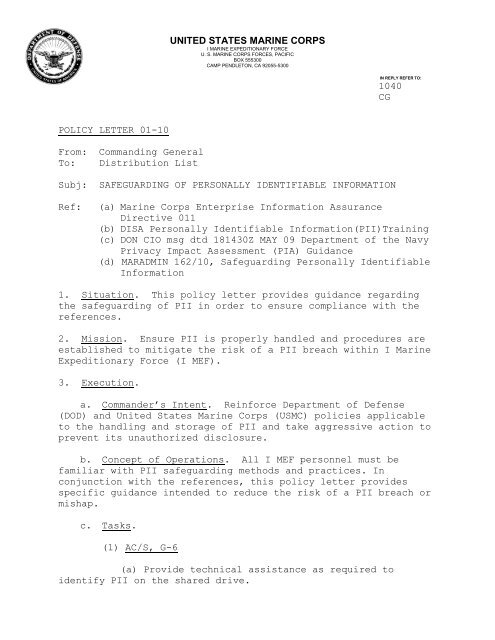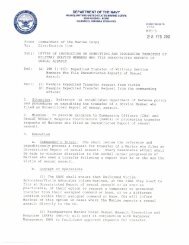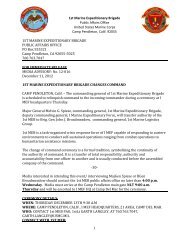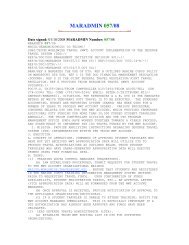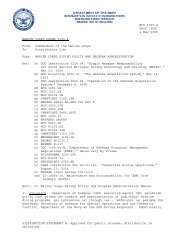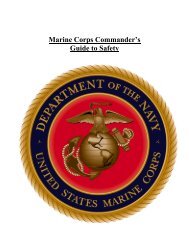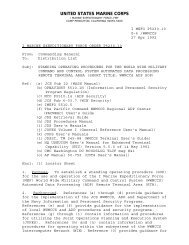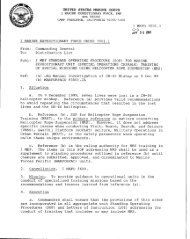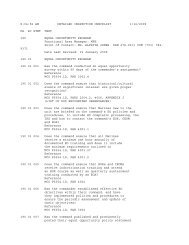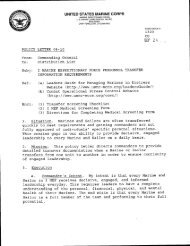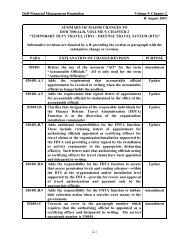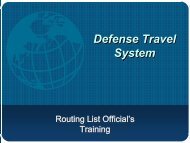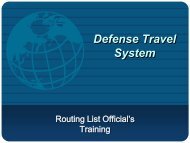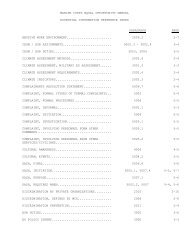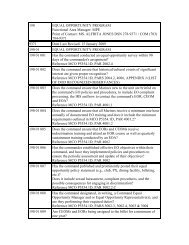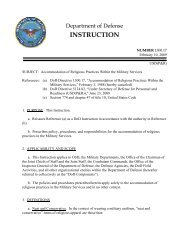Policy Letter 01-10 - I Marine Expeditionary Force - Marine Corps
Policy Letter 01-10 - I Marine Expeditionary Force - Marine Corps
Policy Letter 01-10 - I Marine Expeditionary Force - Marine Corps
Create successful ePaper yourself
Turn your PDF publications into a flip-book with our unique Google optimized e-Paper software.
UNITED STATES MARINE CORPS<br />
I MARINE EXPEDITIONARY FORCE<br />
U. S. MARINE CORPS FORCES, PACIFIC<br />
BOX 555300<br />
CAMP PENDLETON, CA 92055-5300<br />
IN REPLY REFER TO:<br />
<strong>10</strong>40<br />
CG<br />
POLICY LETTER <strong>01</strong>-<strong>10</strong><br />
From: Commanding General<br />
To: Distribution List<br />
Subj: SAFEGUARDING OF PERSONALLY IDENTIFIABLE INFORMATION<br />
Ref:<br />
(a) <strong>Marine</strong> <strong>Corps</strong> Enterprise Information Assurance<br />
Directive <strong>01</strong>1<br />
(b) DISA Personally Identifiable Information(PII)Training<br />
(c) DON CIO msg dtd 181430Z MAY 09 Department of the Navy<br />
Privacy Impact Assessment (PIA) Guidance<br />
(d) MARADMIN 162/<strong>10</strong>, Safeguarding Personally Identifiable<br />
Information<br />
1. Situation. This policy letter provides guidance regarding<br />
the safeguarding of PII in order to ensure compliance with the<br />
references.<br />
2. Mission. Ensure PII is properly handled and procedures are<br />
established to mitigate the risk of a PII breach within I <strong>Marine</strong><br />
<strong>Expeditionary</strong> <strong>Force</strong> (I MEF).<br />
3. Execution.<br />
a. Commander’s Intent. Reinforce Department of Defense<br />
(DOD) and United States <strong>Marine</strong> <strong>Corps</strong> (USMC) policies applicable<br />
to the handling and storage of PII and take aggressive action to<br />
prevent its unauthorized disclosure.<br />
b. Concept of Operations. All I MEF personnel must be<br />
familiar with PII safeguarding methods and practices. In<br />
conjunction with the references, this policy letter provides<br />
specific guidance intended to reduce the risk of a PII breach or<br />
mishap.<br />
c. Tasks.<br />
(1) AC/S, G-6<br />
(a) Provide technical assistance as required to<br />
identify PII on the shared drive.
Subj: SAFEGUARDING OF PERSONALLY IDENTIFIABLE INFORMATION (PII)<br />
(b) Conduct shared drive scans to indentify stored PII<br />
that is not in compliance with DoD and <strong>Marine</strong> <strong>Corps</strong> policy.<br />
(c) Coordinate I MEF reporting requirements in<br />
accordance with the references.<br />
(d) Provide support for PII training requirements.<br />
(2) I MEF Staff and MSCs<br />
(a) Designate staff/organization leads to<br />
remove/modify PII information from respective public information<br />
repositories.<br />
(b) Ensure personnel follow guidelines regarding<br />
storage and distribution of PII within your organizations.<br />
d. Coordinating Instructions<br />
(1) Review staff/organization public information<br />
repositories (shared drives, SharePoint Portal, etc…) to ensure<br />
PII is stored in accordance with this policy.<br />
(2) Remove all files (documents, spreadsheets, databases,<br />
etc…) containing PII that are no longer required.<br />
(3) Ensure files that are still required, which contain<br />
PII are password protected.<br />
(4) Files containing PII that are emailed will be<br />
password protected and the email itself will be encrypted.<br />
(5) Naval messages and E-mails containing PII will be<br />
digitally signed and encrypted.<br />
(6) A PII breach must be reported immediately to the I<br />
MEF G-6 Information Assurance Manager during working hours or I<br />
MHG CDO during non-working hours. A breach of PII occurs when<br />
PII is lost, stolen, released without proper need, improperly<br />
distributed, or incorrectly disposed. A breach is defined as an<br />
actual or possible loss of control, compromise, unauthorized<br />
disclosure, unauthorized acquisition, unauthorized access, or<br />
any similar term referring to situations where persons other<br />
than authorized users and for an other than authorized purpose<br />
have access or potential access to PII, whether physical or<br />
electronic where one or more individuals could be adversely<br />
affected. The following scenarios are examples of PII breaches:<br />
(a) A recruiter has just completed an enlistment<br />
package and goes to lunch. He leaves his laptop in his vehicle<br />
2
Subj: SAFEGUARDING OF PERSONALLY IDENTIFIABLE INFORMATION (PII)<br />
and enters the establishment to eat. Upon returning, he<br />
discovers the car has been broken into and the laptop stolen.<br />
The enlistment information collected on the ONE recruit stored<br />
on the laptop is considered a PII breach and must be reported.<br />
(b) An officer loads his command's fitness reports<br />
onto a thumb drive to work on over the weekend. On his way to<br />
the car, the thumb drive falls out of his pocket and is lost.<br />
The officer's command consists of over 300 <strong>Marine</strong>s. Upon<br />
realizing it was lost, the officer retraces his steps and finds<br />
the thumb drive two days later. Despite finding the thumb drive,<br />
the data was in an uncontrolled environment. This is a PII<br />
breach and must be reported.<br />
(c) A backup tape of a large database that holds<br />
payroll information is unaccounted for. A search for the tape<br />
turns up evidence that a former employee stole the tape. The<br />
tape contains PII for more than 15,000 <strong>Marine</strong>s. Regardless of<br />
the reason, since the tape is missing, this is a PII breach and<br />
must be reported.<br />
(d) An unencrypted email containing PII is sent to a<br />
group of watch officers who have an authorized reason to view<br />
the information. Since the email was unencrypted, this is a PII<br />
breach and must be reported.<br />
(e) An encrypted email containing PII is sent to a<br />
group of watch officers who do not have an authorized reason to<br />
view the information. Although the email was encrypted, since<br />
they did not have a justifiable need to have access to the<br />
information, this is a PII breach and must be reported.<br />
(7) All personnel complete annual PII and Information<br />
Assurance training on an annual basis no later than the last day<br />
of the last month of each calendar year via <strong>Marine</strong>Net or<br />
http://iase.disa.mil/eta/.<br />
4. Administration and Logistics. Points of contact regarding<br />
this policy letter are the G-6 Information Assurance section at<br />
DSN 361-3397 or the AC/S G-6 at DSN 361-9666.<br />
5. Command and Signal. This policy letter is applicable to all<br />
I MEF units and is effective as of the date signed.<br />
DISTRIBUTION: I,II<br />
3<br />
J. F. DUNFORD, JR.


